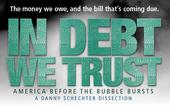Viewers' Reactions
U.S. NATIONAL DEBT CLOCK
The Outstanding Public Debt is now:
In Debt We Trust Trailer
$
$$$
$$$$$
$$$$$$$
$$$$$
$$$
$
Take Action: Help to Stop The Squeeze!
$
$$$
$$$$$
$$$$$$$
$$$$$
$$$
$
Take Action: Help to Stop The Squeeze!
Director Danny Schechter's Personal Statement
IN DEBT WE TRUST started out to be a film about what I thought were other people's problems. I came to realize how deeply they affect me as well. The experience of making this film has led me to understand how many ways policies and practices are tied to a growing national debt burden and have an impact on my personal finances.
Even as a former network journalist and long-time investigative reporter, I was shocked and outraged when I started probing the roots of these issues.
This is a problem involving millions of people and billions of dollars yet it is downplayed and rarely discussed in all of its disastrous dimensions. It's about a growing inequality that some experts fear will lead to a new 21st century serfdom. It's about the transfer of wealth from working people into the vaults and accounts of a relatively small number of financial institutions and real estate interests. The lenders are profiting by charging usurious rates and doing so legally, in part, because they have mastered the art and science of marketing products and then manipulating media, politicians, and political institutions.
Most often, credit card abuses are examined in terms of individuals and consumer scams like identity theft. My film started with that approach but evolved into a much deeper look at what's been called "financialization." This is an institutional problem involving a growing debt-and- credit complex that threatens the very fabric of our nation, not just in terms of a possible financial crash in the future but how it is impinging upon our lives and livelihoods right now.
Over the course of my career, I have made 20 films and won many awards and some recognition. Most have been shown at top festivals and aired on television. I am attached to all of them but INDEBT WE TRUST is different because it doesn't just document suffering, it warns of the implications of consequences that will affect all of us. Perhaps that's why this issue cuts across party and partisan lines in a way that can potentially unite a nation. Perhaps that's why mostly everyone I've told about the film tells me how they've come to be personally ensnared in the debt trap.
My hope is that this film will spark a national response-a demand for economic fairness and justice, regulation in the public interest, along with a heightened sense of personal responsibility by consumers seduced by the false promise of "free money."
What's been called the "democratization of credit" has led to the democratization of dependency. It has created an unsustainable society, trapping millions in a financial hole they can't escape from and often do not understand.
Over the past 25 years, America has moved from a society based on production to a nation driven by consumption; from a country that once shared its resources with the world to one deeply in debt to foreign banks and countries-to the tune of trillions of dollars. As the growing number of bankruptcies and foreclosures testifies, our national debt is mirrored by a skyrocketing consumer debt, with an increasing number of individuals and families unable to cope.
Says former Georgia Governor Roy Barnes, "It is shocking to me that intelligent people, educated people, have not taken time to think about this. We cannot sustain over an extended period of time these high levels of debt. . . particularly at high rates of interest. Because . . . what will happen is that whenever it comes to an end . . . and there is an end to the amount of credit . . . in other words, when it gets so leveraged, it will create an economic crisis so deep that it will threaten us as a nation . . . And so we have this . . . this real threat to the way we are as a people. And nobody seems to be concerned about it."
IN DEBT WE TRUST is concerned about it. My focus is on what to do "before the bubble bursts." First, we need to put this issue on the national agenda. That's the hope behind the film.
Working with the country's leading credit card expert and critic, Dr. Robert Manning, of Rochester Institute of Technology, I intend to use the film as part of an educational campaign to help individuals improve their financial planning and encourage organizations to get involved in a campaign for change.
Over the years, documentaries have helped prompt a national discourse on many issues. That's my hope for IN DEBT WE TRUST, which weave tried to make compelling viewing in a spirited style. Many at the TV news networks whom I have worked with over the years say you can't cover complex issues, especially on economic questions, because "the dismal science" is boring and a turn-off.
My film is out to prove them wrong.
The American public needs to know why debt has become "the enemy," in the words of one of the people we interviewed. All Americans need to know what we can do about it."
